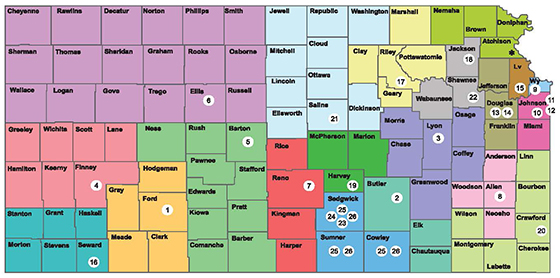Spring 2019 Newsletter
- Sexual Assault Awareness Month
- Kansas Governor Proclaims Sexual Assault Awareness Month
- Kathy Williams Awarded
- Kansas Believe Project
- KCSDV’s Accreditation
- Resources
April is Sexual Assault Awareness Month (SAAM). This is a month when we focus on raising awareness, engaging our communities, and educating our policy makers about sexual assault.

Sexual Assault Awareness Month (SAAM) is a time to work to change societal norms and individual behaviors about sexual violence. Reaching out to our community members about the serious and widespread problem of sexual violence and supporting victims, and survivors, and their families are all vital parts of SAAM.
This year marks the 18th anniversary of SAAM, and the theme is, I Ask. The concept of I Ask is a way for us to elevate consent in discussions on sexual assault awareness and prevention. I ask for consent. I ask how to teach consent early. I ask for digital consent. I ask how power impacts consent.
What is consent? Consent is when someone gives permission for something to happen or agrees to do something and know exactly what they’re agreeing to.
“Consent is always choosing to respect the personal and emotional boundaries of others.”
Sexual violence is any sexual act perpetrated against someone’s will.
Sexual violence includes a range of offenses:
- a completed nonconsensual sex act
- an attempted nonconsensual sex act
- an abusive sexual contact
- a non-contact sexual abuse (e.g., threatened sexual violence, exhibitionism, verbal sexual harassment)
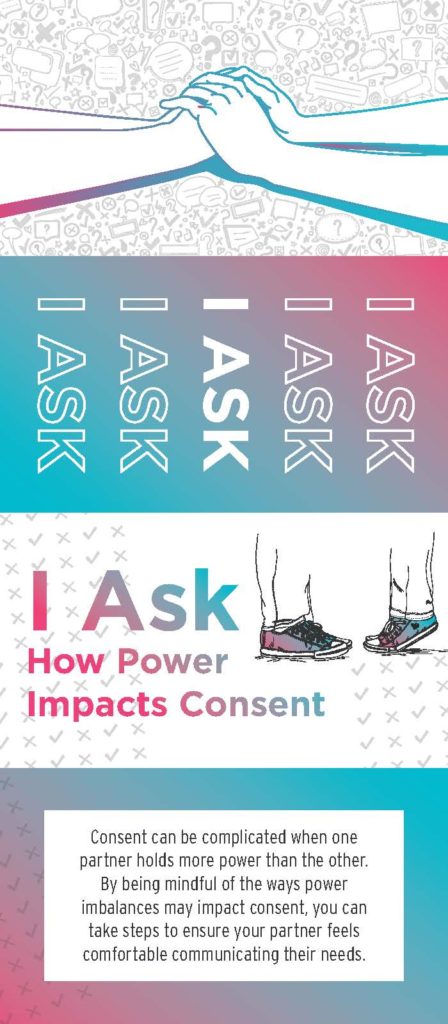
All types of sexual violence involve victims who do not consent, or who are unable to consent or refuse to allow the act. Sexual violence can happen to anyone, regardless of gender, age, race, sexual orientation, socioeconomic status, or ability.
In the United States (U.S.), one in three women and one in six men have experienced contact sexual violence at some point in their lives.
One in five women and one in 71 men have reported being raped in their lifetime in the U.S.
Sex offenders often target people they perceive as vulnerable, less powerful, or less credible. In the majority of cases, the perpetrator is someone who is known to the victim.
The Color Teal
We invite you to join us in wearing teal during this month of April. Teal is the color chosen by the movement to symbolize sexual assault awareness and prevention.
Wearing teal, in whatever form you chose, will help start conversations about sexual assault, including talking about consent, changing perceptions of sexual assault, and supporting survivors of sexual assault.
You can share a picture online of you and others wearing teal, connecting your post and photo to Sexual Assault Awareness Month (SAAM) using the hashtags #SAAM and #IAsk.
Taking action, getting involved, and saying something is everyone’s responsibility. By doing this, we can reach the ultimate goal of ending sexual violence in our communities.
Advocacy Services and Resources
Kansas has 26 sexual and domestic violence advocacy programs serving all 105 counties in Kansas. These programs can provide the support and help victims and survivors might need following a sexual assault. These programs offer services 24/7. Services include a 24-hour crisis hotlines, crisis intervention and support, personal advocacy, medical advocacy, court advocacy, law enforcement advocacy, emergency accommodations, safe shelter, supportive counseling, support groups, and child and youth advocacy. All of these services are free and confidential.
To access these services, call the Kansas Crisis Hotline at 1-888-363-2287. The Kansas Crisis Hotline is a toll-free, 24-hour statewide hotline accessed by phone. You can also call the National Sexual Assault Hotline at 1-800-656-4673 for support.
Find a map of Kansas sexual and domestic violence victim advocacy programs that provide services to victim and survivors at https://www.kcsdv.org/find-help/in-kansas/dv-sa-services-map.
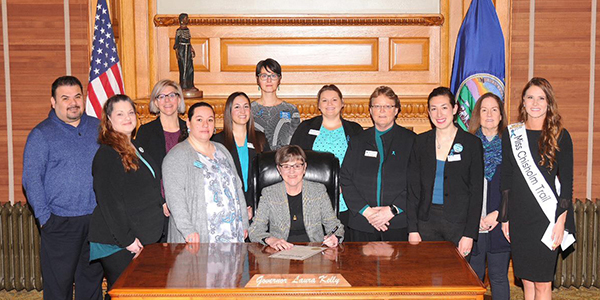 April is Sexual Assault Awareness Month. On March 29, 2019, Kansas Governor Laura Kelly proclaimed the month of April 2019 as Sexual Assault Awareness Month in Kansas. The Kansas Coalition Against Sexual Domestic Violence and partners were present for the proclamation signing ceremony.
April is Sexual Assault Awareness Month. On March 29, 2019, Kansas Governor Laura Kelly proclaimed the month of April 2019 as Sexual Assault Awareness Month in Kansas. The Kansas Coalition Against Sexual Domestic Violence and partners were present for the proclamation signing ceremony.
Sexual Assault Awareness Month is about awareness and prevention of sexual assault, harassment, and abuse.
The National Sexual Violence Resource Center describes the history of Sexual Assault Awareness Month: “Even before its official declaration, SAAM was about both awareness and prevention of sexual assault, harassment, and abuse. Looking at the history of the movement to end sexual violence, it’s clear why: It’s impossible to prevent an issue no one knows about, and it’s difficult to make people aware of a problem without providing a solution. The two work in tandem, and they always have. From the civil rights movement to the founding of the first rape crisis centers to national legislation and beyond, the roots of SAAM run deep.”
In 2018, 26 victim advocacy services organizations across the state served over 6,000 victims of sexual violence. However, only 1,231 offenses of rape were reported statewide to law enforcement. More than one in 12 Kansas women were victims of rape as reported by the Kansas Department of Health and Environment in 2011, and nearly one in five women in the U.S. have been raped in their lifetimes according the National Sexual Violence Resource Center (NSVRC) in 2011. NSVRC also reports one man in 71 men will be raped at some point in their lives. One incident of rape was reported to Kansas law enforcement every seven hours and six minutes.
More than one in three women and nearly one in four men experienced some form of contact sexual violence in their lifetime. In 80 percent of rape cases in Kansas, the offender is someone known to the victim, a statistic that upsets the idea of “stranger danger” and shows the problem is closer to home.
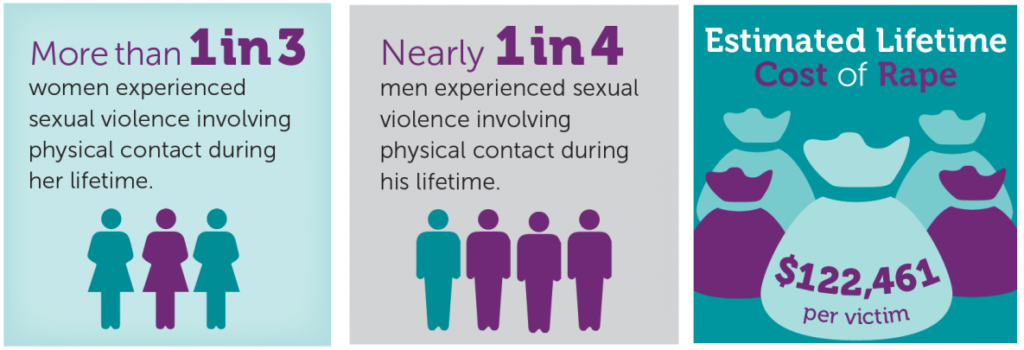 According to the Centers for Disease Control and Prevention, sexual violence is any sexual act that is perpetrated against someone’s will. Sexual violence encompasses a range of offenses, including a completed nonconsensual sex act (i.e., rape), an attempted nonconsensual sex act, abusive sexual contact (i.e., unwanted touching), and non-contact sexual abuse (e.g., threatened sexual violence, exhibitionism, verbal sexual harassment). All types involve victims who do not consent, or who are unable to consent or refuse to allow the act. Sexual violence can happen to anyone, regardless of gender, age, race, sexual orientation, socioeconomic status, or ability. Sex offenders use many methods to intimidate the victim. They might use trickery, manipulation, coercion and pressure, bribery, blackmail, or threats. Offenders often take advantage of people they perceive as vulnerable or less powerful. Offenders may also use alcohol and drugs to compromise an individual’s ability to consent to sexual activity and make it easier for a perpetrator to commit sexual assault because they inhibit a person’s ability to resist and can prevent them from remembering the assault.
According to the Centers for Disease Control and Prevention, sexual violence is any sexual act that is perpetrated against someone’s will. Sexual violence encompasses a range of offenses, including a completed nonconsensual sex act (i.e., rape), an attempted nonconsensual sex act, abusive sexual contact (i.e., unwanted touching), and non-contact sexual abuse (e.g., threatened sexual violence, exhibitionism, verbal sexual harassment). All types involve victims who do not consent, or who are unable to consent or refuse to allow the act. Sexual violence can happen to anyone, regardless of gender, age, race, sexual orientation, socioeconomic status, or ability. Sex offenders use many methods to intimidate the victim. They might use trickery, manipulation, coercion and pressure, bribery, blackmail, or threats. Offenders often take advantage of people they perceive as vulnerable or less powerful. Offenders may also use alcohol and drugs to compromise an individual’s ability to consent to sexual activity and make it easier for a perpetrator to commit sexual assault because they inhibit a person’s ability to resist and can prevent them from remembering the assault.
For more information about sexual violence and to find help, please visit KCSDV’s website at http://kcsdv.org.

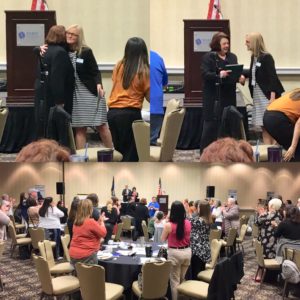
This year, the National Sexual Violence Resource Center (NSVRC) is awarding Kathy Williams with the 2019 Visionary Voice Award. Kathy Williams has been the Executive Director of the Wichita Area Sexual Assault Center (WASAC), a KCSDV Coalition Member Program in Wichita, Kansas, since 1999. (Congratulations to Kathy for 20 years in the position!)
The Visionary Voice Award reflects her professional dedication to ending sexual violence. In 1989, she was first hired as Coordinator of Victim Services at the Wichita Area Sexual Assault Center (WASAC). She remained in that position until 1994.
Five years later in 1999, she was hired as Executive Director of WASAC. Her leadership at WASAC places her in the largest urban area in a rural state. She is committed to serving the entire community, focusing on directing programming to underserved populations throughout the city of Wichita.
She also developed services for the more rural areas near the city when a dual program, serving victims and survivors of both sexual and domestic violence, shut down.
The Visionary Voice Award is presented each year to recipients nominated by the state’s sexual assault coalition. KCSDV acknowledged the Award in person to Williams at the 22nd Kansas Crime Victims’ Rights Conference KCSDV Preconference Institute on April 9, 2019.
2019 Award winners can be viewed on the National Sexual Violence Resource Center’s website at https://www.nsvrc.org/saam/visionary-voice-awards
In 2014, the Kansas Coalition Against Sexual and Domestic Violence (KCSDV) and the Self-Advocate Coalition of Kansas (SACK) partnered on the Office on Violence Against Women Disabilities grant program and formed the Kansas Building and Expanding Leaders and Individuals, Experience the Vision of Empowerment (BELIEVE) project.
KCSDV and SACK’s first collaboration began in 2012 when both organizations recognized the need to address gaps and barriers in responses to people with intellectual and developmental disabilities who are survivors of sexual violence.
The work of this project is all about building respect and relationships, resulting in more information and better response.
With technical assistance from the Vera Institute of Justice’s Center on Victimization and Safety, the Kansas BELIEVE team developed a vision and mission; conducted a needs assessment and report; and developed and are implementing a strategic plan.
Through these efforts, KCSDV and SACK have learned from one another, building sustainable relationships between the organizations and the sexual assault advocacy and self-advocate movements. The Kansas BELIEVE project is working toward sustainable change, increasing capacity within KCSDV and SACK to provide accessible, safe, and supportive services; and developing plans and tools that establish a strong foundation for future work.
 The Kansas BELIEVE team named their experience of working together as equals as “Authentic Inclusion.”
The Kansas BELIEVE team named their experience of working together as equals as “Authentic Inclusion.”
Authentic Inclusion is about a willingness of team members to learn from each other and not view self-advocates as tokens. Self-advocates are valued, collaborative partners and are equal members of the Kansas BELIEVE team.
Authentic Inclusion is about building trust with each other, making accommodations for all team members, and providing a chance for all team members to share their stories and ideas. An equal voice, equitable partnership, and equal decision making belongs to all members of the team. A common slogan used by the Kansas BELIEVE project is: Human, just like everyone else!
The Kansas BELIEVE team worked with sexual assault advocacy, self-advocate, and disabilities experts to develop a toolkit for self-advocates and a toolkit for sexual assault advocates. Both toolkits address accommodations and guardianship. Accommodations and guardianship were two of the main gaps identified during the project needs assessment for sexual assault survivors. The toolkits will be implemented in Kansas communities during 2019. The toolkits will have a focus on authentic inclusion and trauma-informed responses to people with intellectual and developmental disabilities who are survivors of sexual violence.
For more information about the Kansas BELIEVE project, please contact KCSDV’s Rural and Disabilities Projects Manager via http://kcsdv.org/contact.
In 2018, KCSDV’s 26 member programs reported providing sexual and domestic violence victim advocacy services to 77,263 people. To put that in perspective, that is around the same amount of people that can fit into a major league football stadium.
Victims, survivors, and secondary victims received a wide range of “Core Services” from programs including 24-hour hotline services, crisis intervention, personal advocacy, medical advocacy, law enforcement advocacy, court advocacy, emergency accommodations, shelter, supportive counseling, support group, child and youth advocacy, and parent and child advocacy. In addition to these critical services for survivors, advocacy programs also provide community awareness and education.
Provision of these core services is a requirement for advocacy programs to receive accreditation through KCSDV. Services must also be provided in line with KCSDV’s Guiding Principles, which are the foundation all services and accreditation standards. The Guiding Principles for services are: Competent; Safe and Confidential; Respect, Dignity and Compassion; Trauma-Informed and Survivor-Centered; Informed by Survivors; Culturally Relevant; Free and Voluntary; Universally Accessible; and Available to All.
KCSDV’s accreditation process dates back to the 1980’s, when a statewide accreditation committee was formed. The Committee’s charge was to develop a set of basic operating and services standards for domestic violence programs, ensuring continuity of services, increasing program accountability, and providing guidelines for developing programs. In 1985, Kansas became one of the first states to complete a peer-review program accreditation process.
 Since that time, the accreditation standards and processes have gone through several iterations, including the addition of standards for sexual assault services. It has always remained a peer-review process. In 2010, the new accreditation program, “Building a Better Future for Survivors: Sexual and Domestic Violence Services in Kansas” was launched.
Since that time, the accreditation standards and processes have gone through several iterations, including the addition of standards for sexual assault services. It has always remained a peer-review process. In 2010, the new accreditation program, “Building a Better Future for Survivors: Sexual and Domestic Violence Services in Kansas” was launched.
That same year, KCSDV was able to add a funded accreditation coordinator position. The most recent changes to the process occurred in 2013, when the guiding principles were revised and formalized accreditation policies and procedures were adopted.
Currently, programs are accredited on a five-year cycle. Programs complete a comprehensive self-study of their services and agency governance and administration. This self-study is followed by a two-day site visit, conducted by the KCSDV accreditation coordinator and a member of the accreditation committee. The accreditation committee includes five executive directors from across the state. These members serve as the peer reviewers on site visits, as well as the decision-making body regarding accreditation status.
The accreditation process helps ensure that all Core Services are being provided, that the Guiding Principles are being implemented, and that victims across the state have access to consistent services. This process of self-study helps to ensure services are robust and resourced and helps programs identify areas of potential growth.
Lori Hensley, Executive Director at Liberal Area Rape Crisis and DV Services, Inc. in Liberal, Kansas stated, “KCSDV’s accreditation process is invaluable for programs. Accreditation provides professionalism and consistency of services (from KCSDV) to our (Kansas programs). This process is vital to sustaining good, quality services for survivors of domestic violence and sexual assault.”
The accreditation program truly aims to Build a Better Future for Survivors!
This project was supported by Grant No. 2017-MU-AX-0006 awarded by the Office on Violence Against Women, U.S. Department of Justice. The opinions, findings, conclusions, and recommendations expressed in this publication are those of the author(s) and do not necessarily reflect the views of the Department of Justice, Office on Violence Against Women.
KANSAS CRISIS HOTLINE: 888-END-ABUSE | 888-363-2287
Last Updated on Jan 16, 2020


